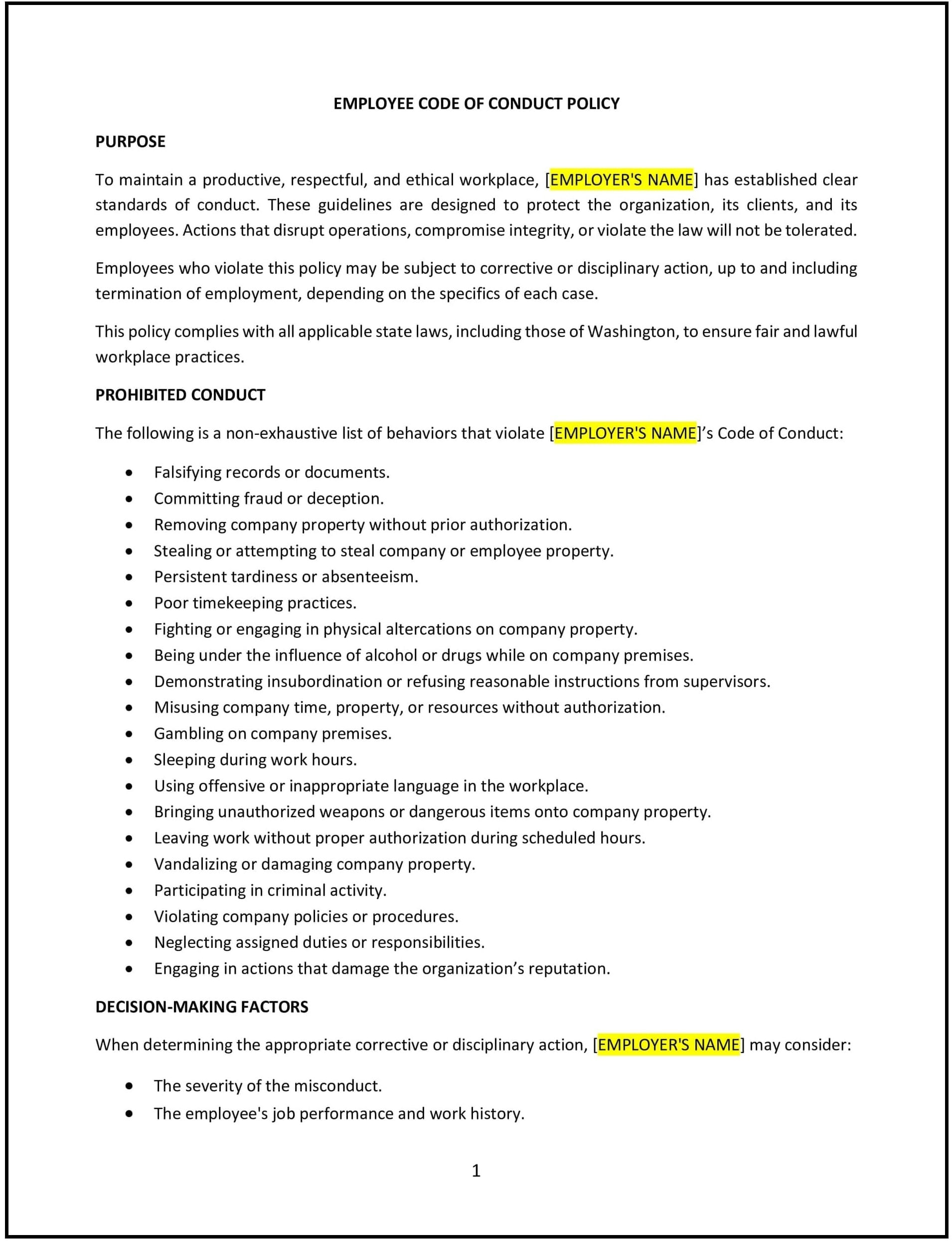Standards of conduct policy (Washington): Free template
Got contracts to review? While you're here for policies, let Cobrief make contract review effortless—start your free review now.

Customize this template for free
This standards of conduct policy is designed to help Washington businesses establish clear expectations for employee behavior and conduct in the workplace. The policy outlines the standards for professionalism, ethical behavior, and respect for colleagues, customers, and the company. It helps ensure that all employees understand what is expected of them in terms of behavior and how to maintain a positive, productive work environment.
By adopting this policy, businesses can promote a culture of respect, accountability, and professionalism, while minimizing the risk of misconduct or unethical behavior.
How to use this standards of conduct policy (Washington)
- Define acceptable and unacceptable conduct: The policy should clearly outline the behaviors that are considered acceptable and unacceptable in the workplace. This includes general expectations around professionalism, integrity, respect, and adherence to company values.
- Specify workplace behavior standards: The policy should detail specific behavioral expectations related to areas such as attendance, punctuality, interactions with colleagues, appropriate language, and dress code. It should provide examples of both acceptable and unacceptable behaviors.
- Address compliance with company policies: The policy should emphasize the importance of adhering to all company policies, including safety guidelines, anti-discrimination policies, and other workplace rules. It should specify the consequences for failing to comply with these policies.
- Ensure compliance with Washington and federal laws: The policy should ensure that employee conduct aligns with applicable Washington state laws and federal regulations, including anti-discrimination, harassment, and workplace safety laws.
- Set guidelines for reporting misconduct: The policy should specify how employees can report misconduct or unethical behavior, including the process for making complaints or raising concerns without fear of retaliation. It should also address how the company will investigate reported incidents.
- Address disciplinary action: The policy should outline the potential consequences for violating workplace standards, including verbal or written warnings, suspension, termination, or other disciplinary measures, depending on the severity of the infraction.
- Review and update regularly: Periodically review and update the policy to ensure it remains compliant with Washington state laws, federal regulations, and any changes in company operations. Regular updates will help ensure the policy stays relevant and effective.
Benefits of using this standards of conduct policy (Washington)
This policy offers several benefits for Washington businesses:
- Promotes a positive work environment: By clearly outlining expected behavior, the policy helps create a positive, respectful workplace where employees feel valued and motivated.
- Reduces the risk of misconduct: The policy reduces the risk of misconduct by setting clear expectations and providing consequences for inappropriate behavior, helping to maintain a safe and productive environment.
- Enhances employee accountability: Employees are more likely to take responsibility for their actions when they understand the consequences of violating company standards. This promotes accountability and fairness across the organization.
- Promotes legal compliance: The policy helps ensure that employees' conduct aligns with Washington state laws and federal regulations, reducing the risk of legal issues related to workplace behavior, discrimination, or harassment.
- Improves company reputation: A business that maintains high standards of conduct is seen as professional, ethical, and respectful. This can enhance the company’s reputation among employees, customers, and stakeholders.
- Supports fair and consistent treatment: The policy ensures that all employees are treated fairly and consistently, which helps avoid favoritism or bias in the workplace. It establishes a uniform framework for managing employee behavior.
Tips for using this standards of conduct policy (Washington)
- Communicate the policy clearly: Ensure that all employees understand the standards of conduct expected in the workplace. Include the policy in the employee handbook, review it during onboarding, and provide periodic reminders.
- Be specific about expectations: Provide clear, specific examples of acceptable and unacceptable behavior to avoid ambiguity. This helps employees understand the boundaries of acceptable conduct.
- Enforce the policy consistently: Ensure that the standards of conduct are consistently enforced across the organization. Apply the same disciplinary measures for similar violations to ensure fairness and transparency.
- Address violations promptly: When misconduct or violations occur, address them promptly to prevent escalation. Follow the policy’s disciplinary procedures to ensure that all incidents are handled appropriately and in a timely manner.
- Offer training and support: Offer training sessions on company policies and appropriate workplace conduct to help employees understand expectations and how to meet them. Provide resources for conflict resolution and support for employees facing difficulties in adhering to the policy.
- Review and update regularly: Periodically review the policy to ensure it remains compliant with Washington state laws, federal regulations, and any changes in the company’s operations. Regular updates will help keep the policy relevant and effective.